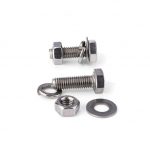When you need to choose the right ACME threaded rods and nuts, who should your supplier be? Well, we hope it’ll be Dependable ACME Threaded Products. We’ve been in the business for over 60 years, and we’re eager to meet your needs with quality products. So what are some things to think about when choosing… Read more »
Blog
What Are the Benefits of Hex Nuts?

What is a nut? When it comes to the hardware industry, nuts are fasteners with a threaded hole, typically used in conjunction with a mating bolt in order to fasten parts together. These two partners– the nut and the bolt– stay together thanks to a combination of friction, stretching and compression. Facts About Hex Nuts… Read more »
Remember This Things When Picking the An ACME Screw Thread

Dependable Acme sells quality Acme threaded products. When you’re looking for Acme screw threads from three-eighths of an inch to two-and-one-half inch diameter, we’ve got what you need. Now how do you pick the right Acme screw? These screws are used in a variety of machinery, including lathes, syringe pumps, linear actuators, and 3D printers…. Read more »
Why Stainless Steel Threaded Rods Are So Reliable

In order to have success in an industrial setting, it’s essential that machines are working properly. Although they might be taken for granted when things are working well, threaded rods are one of the most important pieces of equipment in machines. Available in an array of shapes and sizes, threaded rods will thrive in tough… Read more »
What Are Coupling Nuts?

Do you find that you frequently need to connect two threaded rods together during many of the projects that you work on? Coupling nuts make this very easy to do. Coupling nuts take any two threaded rods and connect them. If you’re interested in learning more about coupling nuts and how they might be able… Read more »
What Should You Look For in an ACME Threaded Rod Manufacturer?

Is your company in need of ACME threaded rods? There are a number of manufacturers out there that can provide them for you. Nevertheless, that doesn’t mean that you should simply pick the first one you can find and trust them to set you up with ACME threaded rods. Instead, you should do your homework… Read more »
Why It’s Essential to Use the Right Thread Gage

When you’re ordering ACME screws, you need to know more than just what diameter they should be. You also need to know what the thread pitch of the screws should be. If you don’t obtain screws with the correct pitch, they won’t do you much good. As such, use the right thread gage to determine… Read more »
Miscellaneous Information Regarding Threaded Rods

Most people are familiar with screws, bolts, and other fasteners. Nevertheless, threaded rods often take a backseat to their more well-known counterparts. Threaded rods help businesses in a wide range of industries. Learn more about them below. What are threaded rods? Threaded rods are metal fasteners that are often made from stainless steel. At first… Read more »
Here’s Why ACME Thread Forms Are Used for Lead Screws

The very first ACME thread forms were invented more than 100 years ago. They were designed to replace square threads. In the end, they didn’t completely replace those threads, but they did find a home in the construction industry and many other industries after they were used to create threaded rods, studs, and other fasteners…. Read more »
Here’s Why Some ACME Screw Lubricants Fail

When you use them properly, lubricants can help you get the most out of ACME screws. Regardless of whether you use liquid lubricants or non-liquid lubricants, you can use them to reduce friction between screws and nuts, allow screws to transmit more power, and even protect your screws for years to come. But there are… Read more »

